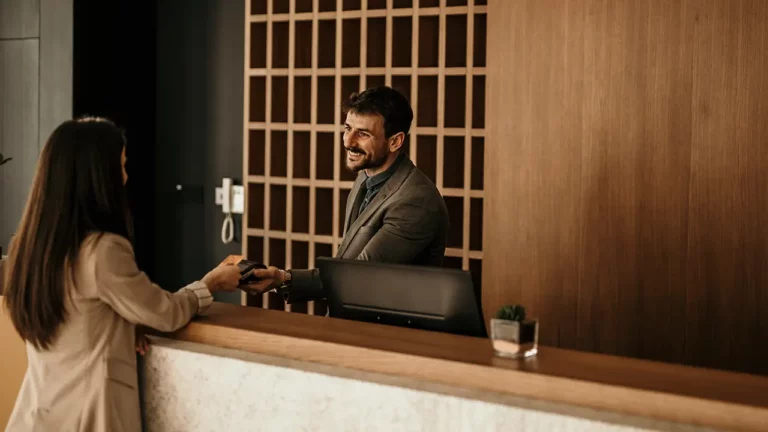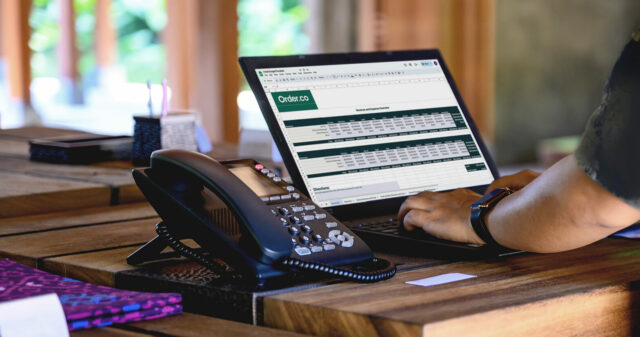Use These Hotel Procurement Companies to Boost Efficiency

Use These Hotel Procurement Companies to Boost Efficiency
Hotels must handle a high volume of inventory purchases and financial transactions to keep services running smoothly. Fortunately, technology can help hotels run efficiently while minimizing hours spent crunching numbers and managing supplies. With the right hotel procurement company, hotels can get the support they need sourcing and purchasing inventory for all areas of internal and guest operations.
Knowing what to look for in a hotel procurement company and software platform makes it easier to select the right tool for your needs. To help you decide which features to prioritize and which companies to consider, we’ve compiled a list of the top procurement platforms to evaluate when sourcing software for a hotel or hospitality business.
Download the free tool: Hotel Budgeting Template
What types of procurement occur in hotel management?
Hotels need a wide array of goods to cater to internal operational needs and enhance the customer experience. The financial investment required for these procurement decisions is significant, representing a substantial part of hotels' operating and supplies budgets.
Navigating the complexity of sourcing reliable suppliers, ensuring product quality, and managing timely deliveries is also challenging. Overcoming these obstacles through strong processes and technology-driven procurement solutions helps hotels maintain operational efficiency and achieve customer satisfaction.
Hotels must plan budgets and logistics for three types of buying. Focusing on these areas ensures employees have the right supplies to provide guests with the expected level of service and comfort.
Back of house
Back of house (BOH) operations focus on things guests do not usually see. Despite being in the background, they are crucial to a hotel's smooth functioning.
This procurement category covers a wide range of supplies essential for daily operations, including:
- Kitchen equipment
- Maintenance tools
- Administrative supplies
- Office equipment
These items ensure that the hotel maintains its operational efficiency and high standards of cleanliness and service, contributing significantly to the overall guest experience.
Housekeeping
Housekeeping is a critical procurement category for hotels. It provides everything necessary to maintain cleanliness and comfort in guest rooms and common areas. This category includes a diverse range of products essential for daily operations.
Common operating supplies within this category are as follows:
- Cleaning chemicals and disinfectants
- Mops, vacuum cleaners, microfiber cloths
- Protective gloves and safety equipment
- Towels, bed linens, and pillows
Efficient management of these supplies ensures that full-service hotels provide guests with a clean, safe, and welcoming environment.
Guest consumables
Guest consumables are items guests use during their stays. The products a hotel chooses can help enhance the guest experience and ensure comfort and satisfaction.
The most common supplies within this category include the items guests consistently reach for when traveling, such as:
- Toiletries like shampoo, conditioner, soap, and body lotion
- Paper goods, including tissues and toilet paper
- In-room coffee and tea products and serving items
- Convenience items like notepads, pens, and laundry bags
High-quality products can boost a hotel's perception, influencing guests' satisfaction and likelihood to return or recommend the hotel to others.
Hotel FF&E procurement challenges
Furniture, fixtures, and equipment (FF&E) are items used within a hotel, such as movable furniture, fixtures not permanently attached to the building, and equipment used on hotel property.
FF&E is the foundation for creating an inviting and functional environment that meets clients' expectations. It includes an array of items, such as:
- Beds
- Sofas and chairs
- Tables and dressers
- Lamps, TVs, and phones
- Doors and electrical outlets
- Artwork
- Commercial kitchen equipment
The selection, procurement, and maintenance of FF&E are vital to hotel operations and interior design. Proper FF&E management significantly influences the overall guest experience and helps promote a hotel's brand image, guest comfort, and operational efficiency.
Hotels often face the following top FF&E procurement challenges:
Budget constraints: High-quality FF&E typically comes with a hefty price tag, making budget management of this category a particular challenge. Balancing financial limitations with the need for durability and aesthetics requires planning and negotiation.
Lead times and delivery schedules: Many pieces of FF&E are custom-made or ordered from suppliers with long lead times. Due to delays in receiving these products, coordinating delivery schedules to align with project timelines can be complex.
Quality and durability: It is crucial to ensure that FF&E items meet required quality standards. Items must be aesthetically pleasing and durable enough to withstand commercial use. Buyers must carefully vet suppliers and their products to maintain such standards.
Sustainability concerns: With an increasing focus on environmental responsibility, sourcing FF&E that is both sustainable and compliant with green certifications can be challenging. To support a hotel's sustainability goals, it must find FF&E items made with eco-friendly materials that have low environmental impact.
Brand consistency: Maintaining a consistent brand image through FF&E selections across different properties can be difficult, especially for hotel chains operating in diverse markets. Each item needs to reflect the brand’s ethos while catering to local tastes and cultural expectations.
5 Top priorities for hotel procurement
Hotels must balance many high-priority needs in their procurement practices. Keeping within budget while remaining appealing and consistent requires careful attention to the purchasing process. Most hotels prioritize the following five aspects of procurement in their buying programs.
Price competitiveness
In hospitality procurement, striking the right balance between cost and quality is paramount. To achieve price competitiveness, hotels must source materials that meet their standards while ensuring financial efficiency. This involves finding suppliers that offer competitive pricing without compromising quality or sustainability. By prioritizing price competitiveness, hotels maintain their commitment to guests while focusing on financial success.
Product availability
Steady access to high-quality supplies helps hotels maintain service standards and guest satisfaction. A consistent supply of preferred products helps hotels meet demand without interruption. Achieving this requires building strong vendor relationships and managing a supply chain with reliable vendors who can deliver the necessary items on time and in the right quantities. Doing so avoids pitfalls like stockouts and delays that can affect reputation and guest experiences.
Eco-friendly products
The growing focus on sustainability in the hotel industry has led to hotels seeking eco-friendly supply alternatives. This move supports global environmental efforts and responds to the increasing consumer demand for sustainable practices. Choosing sustainable supplies reduces ecological impact, boosts local economies, and improves brand image by showing a commitment to environmental responsibility.
Volume purchase potential
Leveraging volume pricing for hotel supplies helps properties improve cost management and profitability. Buying in bulk often secures lower prices per unit, allowing hotels to allocate resources more efficiently. This strategic approach reduces operational costs and ensures ample stock, contributing to seamless guest experiences and sustained business growth.
Visibility and reporting
Strong analytics for hotel supplies spending provide insight into procurement efficiency, reveal cost-saving opportunities, and improve budgeting accuracy. Effective tracking ensures accountability, optimizes inventory levels, and supports strategic decision-making to enhance business sustainability and profitability.
Top hotel procurement companies in 2024
1. Order.co
Order.co has the best combination of features to help hotels get the goods they need across all categories. For boutique establishments (like Lark Hotels), Order.co offers dynamic and curated catalogs of preferred goods and services. Its user-friendly features ensure hotels can remain consistent in their presentation and quality while maintaining strong pricing.
Pros
- The platform lets you shop from your current vendors through a vendor–agnostic API.
- Hoteliers can order, report on, and pay for all procurement needs through a single platform.
- The system lets finance teams consolidate payments across vendors to pay monthly invoices in just a few clicks.
- Organizations can enable locations or teams to order independently using dynamic, permissions-based ordering.
- Spend analysis features help hotels understand spend and cash performance by department, location, and category.
- The system makes it easy to find similar or exact replacements during stockouts so properties can maintain consistent product quality for guests.
Cons
- Some reporting options are still in development since the platform's reporting function is always improving.
- The system cannot be used to purchase certain categories, like software, though hotels can use it to track software spending data.
2. Tipalti
Tipalti offers finance automation software for various industries, including hotels and hospitality businesses. The platform gives teams easy access to AP automation, expense reporting, employee spending, and more. Its features simplify onboarding suppliers for property locations, maintaining tax compliance, supporting international payments for global properties, and sharing data between finance systems.
Pros
- The platform offers strong integrations with many beneficial programs.
- Multiple-vendor payments help save time and reduce fees.
- The system's ease of use increases organization-wide adoption.
Cons
- Some users report difficulty paying in select international currencies, making it challenging for global hotel chains to process payments.
- The platform's bank reconciliation features could be smoother. Some of the quirks in the system require extra research and journal entries to tie to bank statements.
3. Avendra
Avendra offers supply chain management for hotels' supplies and FF&E purchases. It has tools to handle service suppliers, inventory, and large equipment contracts like elevators to keep locations compliant with service and repair licensing. The platform also helps customers reduce costs through operations optimization across the most costly areas of hotels, such as kitchens, cleaning, and freight.
Pros
- It includes features to manage supplies, FF&E, and services.
- It includes an iBuyEfficient procurement platform as part of the management solution.
- Avendra integrates with other hospitality management tools for easy data sharing.
Cons
- There isn’t much public-facing information for the iBuyEfficient platform.
- One user on LinkedIn mentions there is no top-level view of property purchase orders.
- PO statuses do not update to reflect the receiving status on orders.
4. Procurify
Procurify is a mid-market spend management and procurement tool with valuable features like payment processing, reconciliation, and invoice matching. Although this reporting system provides robust data on the procurement process and associated vendor and invoice information, teams cannot purchase through the platform, a feature important for high-volume procurement businesses like hotels and hospitality brands.
Pros
- The catalog provides information on previously purchased items for consistency in customer and back-of-house experiences.
- Procurify offers a mobile app for receiving goods.
- The platform's budget analysis features allow approval for purchase requests and ways to improve spend visibility for locations.
Cons
- Some reviewers say the system can be glitchy, especially regarding reporting.
- Certain operations in the order intake feature can be clunky and require redundant work if the PO is declined.
- Departmental visibility isn’t available. This can cause issues for brands managing multiple locations or processes within a location (such as customer-facing purchases versus administrative back-of-house supplies).
5. Precoro
The Precoro procure-to-pay (P2P) platform is a small-business-focused procurement system that offers inventory management, invoice approval workflows, budgeting controls, and other key features that help hotels run operations efficiently. This process-oriented procurement solution can help small businesses systematize their AP and purchasing programs.
Pros
- The platform has strong budgeting features that work well for hotels and companies in the hospitality industry.
- The service's simple user interface makes it easy for employees across properties to order what they need.
- Precoro’s customizable reporting capabilities help brands visualize data across the organization or at specific locations.
Cons
- Some functions that are useful for hotels, such as receipt creation for company POs, can be cumbersome.
- The error-checking features within the invoice processing workflows can be slow, causing backlogs in a high-volume invoice business like a hotel property.
- According to some users, the features that tie budgets to purchase orders could use improvements.
6. BirchStreet
This hospitality-focused platform offers procure-to-pay services for hotels and other hospitality businesses. The tool includes many services common to procurement platforms, such as auto-matching, invoice management, payment processing, and reporting. The platform also has features unique to hotel and service industry operations, like recipe management and granular inventory management tools. Where BirchStreet is hospitality-specific, it’s a good fit for large hotel chains that want to manage hundreds or thousands of properties.
Pros
- The platform allows users to manage large capital purchases.
- BirchStreet offers a purchase order system for supported vendors.
- The tool allows RFQ, RFP, PO invoice, and AP invoice management.
Cons
- There is no demo version, so small businesses may have a hard time evaluating the platform.
- BirchStreet has some reporting limitations, making it hard to find specific data or customize reports.
- Some users find the UI difficult to navigate and require training to get the hang of it.
7. Planergy
This cloud-based procurement system creates financial control for companies across all industries by helping users manage inventory and build better procure-to-pay practices. Since the Planergy platform is geared toward small businesses, it's a solid choice for boutique or single-property hotels. It also integrates well with programs like Oracle, SAP, Quickbooks, and other popular enterprise resource planning (ERP) software.
Pros
- The platform offers strong integrations for visibility across systems.
- Planergy’s popular supplier information and supplier management tools are useful for hotels with a large vendor pool.
- The software's customer support team makes platform setup and use easy.
Cons
- Plenary's search features can be too rigid, making it challenging for high-volume buyers like hotels to find what they need.
- The system may be too basic for inventory management at a level necessary for hotel operations.
- You can’t perform job spend monitoring or create credit memos.
Improve hotel procurement services with Order.co
The right software can put the power of better budgeting and demand forecasting in your hands. From insights on purchasing trends to easy access to the most price-competitive and high-quality vendors, a procurement platform like Order.co can help your hotel maintain efficiency and consistency without overspending.
Want to take the next step in improving your hotel's procurement practices? Request a demo of Order.co to get started.
Get started
Schedule a demo to see how Order.co can simplify buying for your business.
"*" indicates required fields


![7 Benefits to Building a Solid Procurement Strategy & How To Do It [2023]](https://www.order.co/wp-content/uploads/2023/04/iStock-1188425195-640x360.webp)
